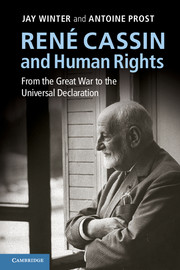Book contents
- Frontmatter
- Contents
- List of plates
- Preface and Acknowledgments
- Introduction to the English edition
- List of Abbreviations
- Part I In the shadow of the Great War
- 1 Family and education, 1887–1914
- 2 The Great War and its aftermath
- 3 Cassin in Geneva
- 4 From nightmare to reality, 1936–1940
- Part II The jurist of Free France
- Part III The struggle for human rights
- Index
- Plate section
- References
2 - The Great War and its aftermath
Published online by Cambridge University Press: 05 April 2013
- Frontmatter
- Contents
- List of plates
- Preface and Acknowledgments
- Introduction to the English edition
- List of Abbreviations
- Part I In the shadow of the Great War
- 1 Family and education, 1887–1914
- 2 The Great War and its aftermath
- 3 Cassin in Geneva
- 4 From nightmare to reality, 1936–1940
- Part II The jurist of Free France
- Part III The struggle for human rights
- Index
- Plate section
- References
Summary
On 1 August 1914, when René Cassin joined his unit in Antibes, he did not know that his life was about to change radically. The same would happen again in 1940, during the Second World War. In 1914, he was still a young man, though his professional training and education were mostly completed. The Great War opened up a new path. It was, for him as for others of his generation, a foundational event.
It was not only that this extraordinary experience, totally impossible even a few weeks before to imagine in its immediate and concrete reality, marked him indelibly, and above all, in his flesh and bones. The overwhelming majority of the men of his generation went through the same hardships, frequently for longer periods and in even more devastating ways. Cassin was wounded early in the war; thus he did not go through Verdun, nor the Somme, nor gas, nor the worst of trench warfare. Nevertheless, the war changed the course and shape of his life. Most veterans, even the disabled men among them, tried to return to their previous lives, as if nothing had happened to them. They again took up the plough, the plane and the hammer, put back on their overalls and work clothes, and set aside their memories of the nightmare through which they had passed, rarely talking about it, even to their loved ones. For them the war’s legacies were simple: on the one hand, it was the worst of plagues and produced shirkers and shameful profiteers. On the other hand, they never lost sight of love and the simple pleasures of existence and the joys of camaraderie.
- Type
- Chapter
- Information
- René Cassin and Human RightsFrom the Great War to the Universal Declaration, pp. 19 - 50Publisher: Cambridge University PressPrint publication year: 2013



